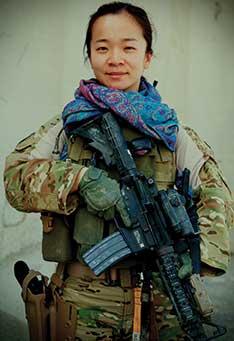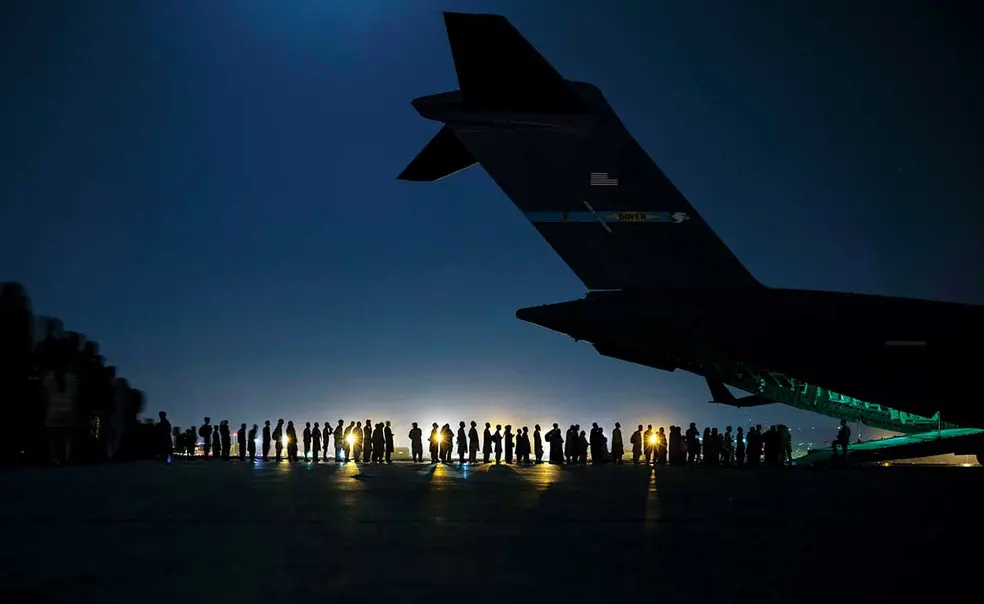Princeton Alumni Volunteers Are Helping Allies Flee Afghanistan
Princetonians and others volunteering with No One Left Behind have helped more than 2,000 Afghans leave the country
Nearly a decade ago, Annie Yu Kleiman ’05 trained a select group of women for an Afghan special operations team when she deployed to the country as an Air Force officer. Even when the American-backed government controlled Afghanistan, women took a risk when they joined the military.
“They were in danger for being in the military, they were in danger for being ethnic minorities, they were in danger for challenging these traditional gender stereotypes,” Kleiman says. “Some of these women were in danger from their neighbors, who would see them leave early in the morning and then see them come back home late at night.”
Eventually the government fell, and the Taliban completed their takeover of the country. The jeopardy that these women faced became more urgent as the Taliban advanced in the summer of 2021. By that time, Kleiman had joined the board of No One Left Behind, an organization dedicated to helping Afghan partners of American forces come to America and restart their lives. She was able to help some of the Afghans she trained navigate complex immigration rules and leave the country.
No One Left Behind primarily works with Afghans who are eligible for the Special Immigrant Visa (SIV), a program for translators and others who worked with the American government and contractors. Up to 160,000 SIV-eligible people were unable to leave Afghanistan during the Taliban takeover and remain there, according to a State Department estimate from May. No One Left Behind had helped more than 2,000 people leave the country since Kabul fell, as of late September.
Since the withdrawal last year, the organization’s work has broadened from its previous focus on direct aid for SIV recipients to include more advocacy in Washington, D.C. The organization would like to make it easier for eligible Afghans to receive visas and come to America.
Abdul Waqar Amiri, an Afghan SIV recipient, would not have made it to America without the organization’s assistance, he says. Amiri fled to Pakistan once the Taliban took over, and he waited there for six months before the U.S. government approved his visa.
“These are folks who understand what it’s like to live without the freedoms that we have. I speak with them every day, and so many of them still believe in the American dream.” — Jeff Phaneuf *21
“I was kind of losing my hope,” Amiri says. “No One Left Behind helped me in the most difficult time.”
By the time Amiri’s visa was approved, he could not afford to fly out of Pakistan, he says. A former colleague recommended the organization, which bought a plane ticket and connected him with refugee aid in America.
“These are folks who understand what it’s like to live without the freedoms that we have,” says Jeff Phaneuf *21, a former Marine Corps officer who works at the organization. “I speak with them every day, and so many of them still believe in the American dream.”
During the withdrawal, Phaneuf received a call from a friend who was still in the Marines and processing visas at the Kabul airport. If Phaneuf could help visa applicants gather some information, including their full names, dates of birth, and national identification numbers, overloaded soldiers at the airport could speed up approvals, allowing more people to get on planes to safety.
Phaneuf’s experience in both the military and politics left him well-positioned to coordinate evacuations. He deployed to Iraq during his military service, and he managed the first congressional campaign of Rep. Seth Moulton, D-Mass. After the withdrawal, Phaneuf continued to volunteer with informal veteran-led networks that helped their Afghan partners before becoming the full-time advocacy director at No One Left Behind.
“Seeing the unique ability to influence whether or not people got in, it felt like a form of playing God that I would never want to experience again,” Phaneuf says. “But it did enable me to get a lot of people out.”

“We know of a number of people whom this will make eligible to apply,” says Caroline Jones ’18 *22, national security adviser to Moulton, who sponsored the provision. The long-term goal is to pass legislation that would enshrine the SIV as a permanent program that would not be limited to specific countries, Jones says. Executive agencies, such as the State and Defense departments, could decide that a certain group is eligible under such a law. Today, Congress must act for partners from a particular country, in a particular conflict, to become eligible.
Protecting and expanding the SIV program is a matter of America honoring its promises, according to David Petraeus *85 *87, who commanded coalition forces in Afghanistan and advises the organization.
“Our country made a commitment to those individuals who served on the ground with our soldiers, and we haven’t met that commitment,” Petraeus says. “They’re going to die of old age before they get out, in some cases.”
Military and foreign policy circles have turned their attention away from Afghanistan in the year since the withdrawal. Yet helping SIV-eligible Afghans remains urgent because the American government will have to ask for someone else’s help at some point in the future, says Deven Sukha ’25.
He interned this summer with No One Left Behind’s advocacy team, compiling data on visa applicants and doing outreach. While many in the organization have already retired from the military, Sukha, who is part of Princeton’s Army ROTC program, has his service ahead of him. He sees it as a personal issue.
“The greater goal is moving toward the future,” Sukha says. “If I’m leading a platoon, I want to make sure the interpreter that I have can trust me, and I can trust him.”












No responses yet